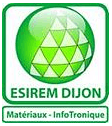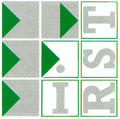ESIREM
Ecole supérieure d'ingénieurs en matériaux/développement durable et en Informatique/Électronique (ESIREM) is a French public research engineering school founded in 1991. It is one of the five[a] grandes écoles of the University of Burgundy and is located in Dijon, France. The professors (mostly researchers) have been involved in efforts to develop data processing, embedded systems, medicals, telecommunications networks, algorithms and optics. The engineering programs offered at ESIREM have also expanded beyond the physical sciences to include courses such as business management and project management.
 | |
| Type | Public |
|---|---|
| Established | 1991 |
| Director | Albert Dipanda (acting director) |
| Students | Ésirémiens, Ésirémiennes |
| Undergraduates | Classe préparatoire |
| Postgraduates | BAC+5, French equivalent to Master's Degree |
| Location | Burgundy , , France |
| Website | esirem.u-bourgogne.fr |
The school was previously known as FIRST and changed its name to ESIREM in 1998.
Degrees offered
ESIREM delivers diplômes d'ingénieurs (equivalent to Masters of Engineering or MEng in Anglophone countries) in two distinguished fields, Informatique/Électronique (computer science and electronics) and Matériaux (material science). Each department has about 50-100 students and produces about 100 graduates a year. Its building is located between the sports faculty and the sciences faculty at the University of Burgundy.
Both engineering degree programs are accredited by the Commission des titres d'ingénieur[1] (CTI) and Ministère de l'enseignement supérieur et de la recherche[2] (Ministry of higher education and research). ESIREM is a member of the Conference de Grandes Ecoles de Bourgogne.[3]
Admission
ESIREM has the standard admission process for Grandes écoles, where students have to have completed the following series of preparatory coursework:
Admission to first year (out of three years)
- Cycle preparatoire (2 years)
- the core course curriculum of the Groupe Archimède engineering schools (2 years)
- These are Mathematics, Chemistry, Physics, Engineering Science, and Modern Technologies
- IUT scientifique (2 years)
- Licence scientifique (2 years)
Admission to second year (out of three years)
- Masters M1, IUP, MST (3 years)
Admissions are highly selective and based on exam results and personal interviews.
Students also can sit for a national exam[4] for Grandes écoles.
Tuition costs
The average tuition is €700 a year, with scholarships available. The fee includes lectures, lab studies, insurance and registration. See Education in France for further details.
Academics
Most lectures are conducted in French. Students are also required to pass the TOEIC English test with a minimum mark of 750/990. While most students are French, there are significant numbers of foreign students starting a program each year. Students are encouraged to intern in foreign countries.
Matériaux
Matériaux or material sciences was the main degree program at ESIREM when it was founded. It covers all aspects of material science, research and material engineering.
Informatique/Électronique
Informatique/Électronique (Computer engineering, telecommunication and electronic engineering) was founded in 2003 in response to the increasing demand for engineers in the industry worldwide. First-year students in this program are required to complete an extensive two-semester core curriculum that covers physics, mathematics and computer science.
During the second year, students can choose to pursue their studies in embedded electronics architecture (Architectures Electroniques Embarquées (A.E.E)) or network security, quality and architecture (Sécurité et Qualité des Architectures des Réseaux (S.Q.A.R)). Students are trained to overcome stress and solve problems professionally during the second and third years, becoming skilled engineers in a number of areas.
Contrat professionnalisation (for final year students only)
Students who wish to work in the engineering industry can work under ESIREM's supervision at the company of their choice. Students must complete project-based activities during this period, rather than odd jobs. The contrat professionnalisation (or Contrat Pro) begins in October and lasts until the end of the school year.
Internship
Students are required to complete an internship each year. In the first year, the internship must last at least a month. In the second year, it is at least 10 weeks, and in the third year, at least five months.
Many students intern abroad in Europe, Asia, Africa and the Americas.
Research and collaboration
ESIREM has numerous collaborative partnerships with labs,[5][6][7][8] foreign universities and companies. These collaborations have been gradually increasing.
Activities
BDE ESIREM is an active student council that manages various activities from the annual GALA to sports events.
Logo
 1991-1998
1991-1998.gif) 1998-2007
1998-2007 2007-2016
2007-2016
Notes
- a. ^ The other Grandes écoles are Agrosup Dijon (ex-ENESAD and ENSBANA), ISAT[9] and ITII[10]
References
- "Commission des Titres d'Ingénieur - La CTI est un organisme indépendant chargé d'habiliter, de développer et de promouvoir la formation et le métier d'ingénieur en France et à l'étranger". Cti-commission.fr. Retrieved 2012-08-17.
- "Accueil - MESR". enseignementsup-recherche.gouv.fr. Retrieved 2012-08-17.
- Archived July 16, 2011, at the Wayback Machine
- Archived July 22, 2010, at the Wayback Machine
- Archived January 28, 2010, at the Wayback Machine
- "Laboratoire Interdisciplinaire Carnot de Bourgogne". Icb.u-bourgogne.fr. Retrieved 2012-08-17.
- Archived June 1, 2007, at the Wayback Machine
- "CNRS - Délégation Centre-Est". Cnrs.fr. Retrieved 2012-08-17.
- "Institut Supérieur de l'Automobile et des Transports - L'ISAT est basé à Nevers / Magny-Cours". Isat.fr. Retrieved 2012-08-17.
- "IngĂŠnieur par apprentissage, ITII Bourgogne, licences professionnelles". Itiibourgogne.com. Retrieved 2012-08-17.